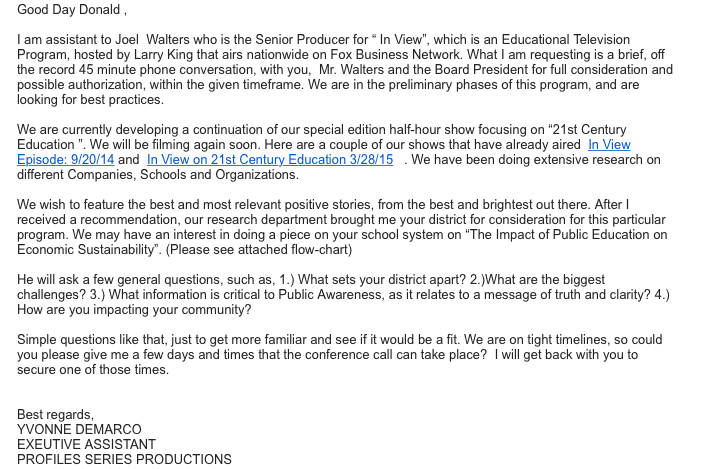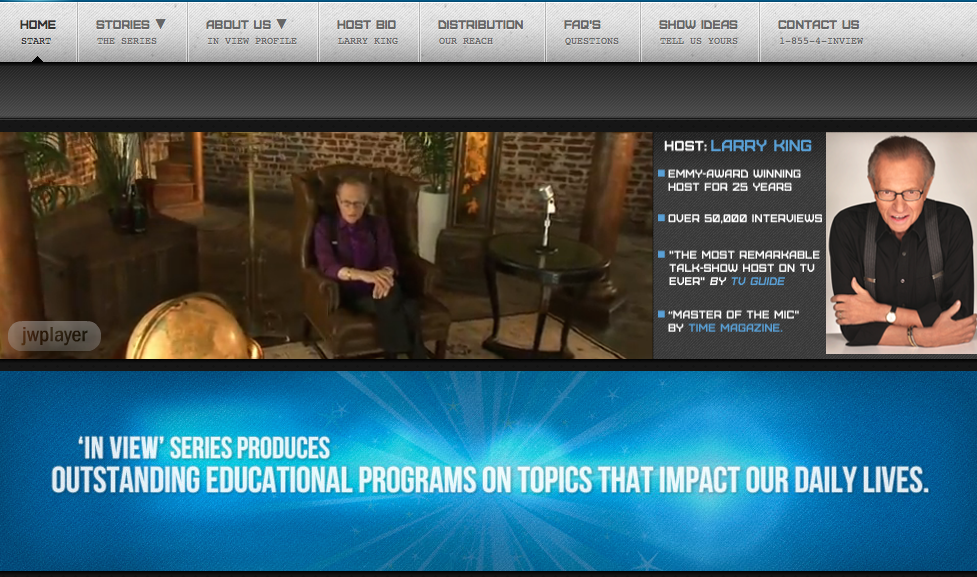 It’s no secret that public school districts don’t have huge marketing budgets. But on June 24th, 2015, an executive assistant from In View — an educational program hosted by Larry King — contacted Superintendent Donald D. Owen and not-so-subtly asked for $30,000 to film a promotional feature of Urbana School District #116.
It’s no secret that public school districts don’t have huge marketing budgets. But on June 24th, 2015, an executive assistant from In View — an educational program hosted by Larry King — contacted Superintendent Donald D. Owen and not-so-subtly asked for $30,000 to film a promotional feature of Urbana School District #116.
“To be honest,” said Owen, “I ignored the email at first. But then she followed up with two voicemails. So I talked with Joanne [Geigner, Communications Specialist for Urbana School District] about it. We decided it wouldn’t hurt to at least call and find out what the email meant.”
The interview request from In View says that the show’s research team heard about Urbana School District via a recommendation. Typos and spacing irregularities aside, the email is fairly convincing:

In View requested that the initial phone call include not only the superintendent, but also an elected official. Owen reached out to board members, two of whom were available to attend the meeting. Owen, the board members, and Geigner spoke to Joel Walters, who identified himself as an In View senior producer.
“The first thing that happened,” said Owen, “was about a 45-minute interview about what’s innovative at Urbana Schools. They asked about our successes, challenges, and the hurdles we need to overcome. They asked about the demographics of our district, including funding information and how many students receive free and reduced lunches. By the end, they had a very complete profile of our district. They knew that we’re a very diverse school district, that 70% of our students qualify for free and reduced lunch, and that we’re in a state and a community that are financially strapped.”
And that’s when In View’s line of questioning changed.
“Walters asked, ‘How much do you invest in PR and Marketing?’” said Owen. “I told him essentially $0, except for JoAnne’s salary. She does all our communication and handles our social media presence.”
Walters then went on the “hard sell,” according to Owen, saying how it’s critical for schools to brand themselves effectively in tough economic times. In exchange for roughly $30,000 — around $3,000 in travel expenses per person for the film crew — Urbana School District would be featured in a five-minute video that would be introduced by Larry King and would air on FOX Business.
“I was sitting there thinking: that’s a first year teacher,” said Owen.
According to Owen, when Walters mentioned the $30,000 amount, one of the school board members, Paul Poulosky, went “red in the face” and said “we’re done.”
“What they were offering was just ridiculous,” said Geigner. “They made it very clear that Larry King was not going to come to Urbana. We weren’t going to actually sit down with Larry King. What we would have ended up with was a thirty-second advertisement, an eight-minute commercial they would help us produce, and the five-minute feature on In View. That’s only 13 1/2 minutes of video for $30,000. We could go to Shatterglass Studios and get a full-length documentary for that amount.”

Owen said that if he had an extra $30,000 lying around, he would put the money toward the gaps that Urbana School District still has in its strategic plan.
“I would put that money toward creating personalized learning environments for our students and putting technology in the hands of our students,” said Owen. “We do have a small but influential broadcasting club at Urbana High School. They were chosen to broadcast IHSA tournaments because of the amount of exposure they received by broadcasting local games. They create all the content — they interview teachers, for example, about what it’s like to win a grant or how they are going to impact students in their classrooms. Can you imagine what it would be like if we could put a complete video editing room in the high school? That would be about students creating things rather than just ingesting things.”
Urbana School District’s philosophy of helping students pursue their personal greatness has opened up many opportunities for students interested in broadcast media.
“We now have a student filming all of our board meetings,” said Owen. “The park district and the library have come to me and asked if they can hire our broadcasting club to film their board meetings and special events as well. That feels good to me. That is what’s wonderful about Urbana — we’re able to have that kind of network, and we’re small enough that word travels fast. These aren’t high value productions like what we would have gotten from In View. But they give students the opportunity to learn something in the process. We’d much rather spend money on our students.”
Some school districts elsewhere around the country appear to be biting when approached by In View, however. The initial email mentions a couple previous features of public school districts, and Joel Walters was apparently in contact with Arkansas’s Benton School District in March 2014.
“It terrifies me that public dollars are being spent that way,” said Owen. “Maybe it’s just because we live in Urbana — we’re a small town, we’re financially strapped, and we’re still feeling the impact of years and years of very painful budget cuts. But I just can’t imagine justifying the use of public dollars in that way.”
Geigner agreed. “I would love to have a $30,000 marketing budget. But do I know it would be better served in our district if it were at the student level? Absolutely. That’s why I don’t push too hard. I know that if we had that type of money to spend, there are all kinds of things that come first. If the students have the technology, they can make a story with it, and then I can publicize it.”
To me, this strange story of completely misplaced marketing tactics speaks to the way in which public schools have been misunderstood as education corporations over the past ten years or so. Public schools are, after all, public. Public schools may need to explain what they’re doing to the community, or even to brand themselves, but does it make sense to actively (and expensively) market schools, which, after all, aren’t selling anything?
I think Owen agreed with the gist of what I mean.
“Right now, in this country, there’s a misunderstanding about the purpose of public education,” he said. “Public education is public. Public means everyone. It means doors are not closed to people. There’s a disconnect between this definition of public education and the way it’s being attacked as a publically funded waste of money. That’s why something like In View’s pitch can be successful at this time: public education is under attack, and people are grasping at straws to find out how they can fight back. They think that fighting back might mean marketing public education so people understand it and want to support it. That, to me, is a very sad thing. I wish I could wave a magic wand and take all the money that’s being spent on Larry King’s In View and invest it in schoolteachers, students, and technology. We should recognize that our national dialogue about public education is an opportunist’s dream. And it’s scary because somebody’s going to bite.”








